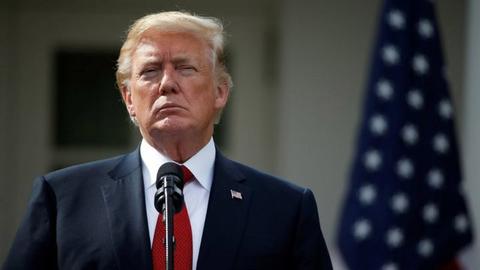On the heels of the May 8 announcement that the United States is pulling out of the nuclear deal with Iran, President Donald Trump has now issued an executive order to the US Treasury, State and Energy departments, saying that the time is right to impose the most stringent sanctions on Iran. Current conditions in the global oil market mean that sanctions will lead to significant reductions in Iranian oil exports.
Because most of Iran’s oil transactions are conducted in US dollars, the US Treasury is informed of all financial transactions in US currency and imposes stiff fines on banks that violate the sanctions. And the sanctions to be re-imposed by Trump’s executive order are some of the heaviest in US history — the same sanctions Iran was under between 2012 and 2016, and which were lifted after the nuclear deal, officially known as the Joint Comprehensive Plan of Action, or the JCPOA.
To implement the sanctions, the US allows time for Iranian oil customers to reduce their purchases step by step, following guidelines set every six months by the US Treasury and the Department of Energy. This step by step approach is meant to give other oil-producing sources an opportunity to fill the gap in the market resulting from Iran’s absence so that prices will not dramatically escalate — something that, in practice, would benefit Iran. At every step, buyers of Iranian oil must reduce their purchases from Iran to the level specified by the US government.
Violations of oil sanctions will result in sanctions or fines on banks that transfer the payments for the purchase of Iranian oil to the foreign bank accounts of Iran’s Central Bank. Again, since the majority of the proceeds from Iranian oil transactions are in US dollars, the Treasury Department stays informed of these transactions and will impose heavy fines on them. But if the banks follow the American guidelines, then the US government will issue statements to the effect that these banks will not be sanctioned or fined.
Under such conditions, neither governments nor private customers around the world will be interested in buying oil from Iran. But even if they do purchase Iranian oil, banks will refuse to transfer money to the Iranian government’s accounts.
When the first round of US sanctions started, Iranian oil exports dropped from about 2.5 million barrels a day to less than 400,000 within four years. It is very likely that the resumption of sanctions will have the same effect.
Oil for Food?
When the impact from this first round of sanctions began to show, some members of the parliament and politicians warned that Iran might be reduced to having to trade its oil for food, as happened in Saddam Hussein’s Iraq following the country’s 1990 invasion of Iraq. And immediately after the JCPOA took effect in October 2015, Amir Hossein Zamaninia, Iran’s deputy oil minister, said: “Without the JCPOA, our crude oil exports would have fallen to zero.”
Even though the US had allowed a certain amount of oil transactions with Iran during the sanctions period, many banks refused to transfer even the permitted amounts to Iranian accounts because they feared that they would run afoul of US sanctions. This forced Iran to trade oil for the national currency of its customers. India and China, the two major purchasers of Iranian oil, paid Iran in their own currencies. At times, they refused to pay at all and purchased oil from Iran in exchange for goods. Thus, Iran, which had traditionally been the second biggest oil exporter in the world, lost its place to Iraq. A year after the JCPOA went into effect and sanctions were lifted, Akbar Torkan, senior advisor to President Hassan Rouhani, said that China and India were Iran’s only oil customers, that the manner in which they purchased Iranian oil was “humiliating” — and that they still owed Iran money.
Serious consequences from the sanctions against Iran relating to oil are likely to emerge 180 days after Trump’s executive order. That happens to fall on November 4, 2018, the anniversary of the 1979 occupation of the US embassy in Tehran and the ensuing hostage crisis.
Warnings of Sanctions Scared off Customers
According to Akbar Torkan, China blocked $22 billion of Iran’s oil sales proceeds in a bank account and announced that it would loan Iran the same amount of money. “First they deducted $4 billion for the interest on the loan,” said Torkan. “Then for the $18 billion they were loaning us, they imposed an insurance rate of eight percent so that if Iran failed to pay the loan installments, they can compensate for it by using the proceeds from that insurance.”
India came up with another way to pay for Iranian oil. “They divided the oil money into two parts,” said Rouhani’s advisor. “One part was deposited into an account in euros, and the second part went into an account in rupees. We could not use euros to buy things so that account was [practically] blocked. From the rupee account, we could buy from India but at a price that they set.”
After the temporary Geneva nuclear deal in 2013, Iran was allowed access to some of this money. Two years later, after the JCPOA went into effect, it was able to demand and receive the money that it had not received for its oil customers during the sanctions. But since the beginning of 2018, after President Trump started talking about re-imposing the sanctions and five months before he officially ordered them, a number of Asian customers of Iranian oil started to reduce their oil imports from Iran.
President Rouhani was not even able to persuade one of its oldest customers to reconsider. A few months before the return of the sanctions, President Rouhani paid a state visit to India and offered them a deal: If India would increase its oil imports from Iran, then Iran would not charge them for transporting the oil. But, fearing the return of the sanctions, India did not bite.
Now, only 26 months after JCPOA went into effect, we have to wait for November 4 to see the first effects of the sanctions — the same day that in 1979 started the whole saga.
visit the accountability section
In this section of Iran Wire, you can contact the officials and launch your campaign for various problems

























comments